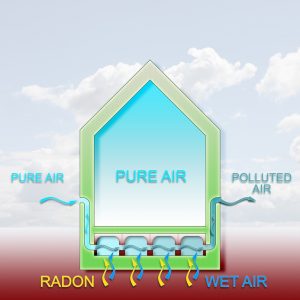 As a homeowner, there are a lot of things to worry about to ensure your home is as safe as it can be for you and your family. Radon gas is one of those, especially for families in Colorado. Because there is a lot of confusion over exactly what is radon and why a home needs to invest in radon mitigation and abatement services, we have compiled some frequently asked questions about this element.
As a homeowner, there are a lot of things to worry about to ensure your home is as safe as it can be for you and your family. Radon gas is one of those, especially for families in Colorado. Because there is a lot of confusion over exactly what is radon and why a home needs to invest in radon mitigation and abatement services, we have compiled some frequently asked questions about this element.
Q: What exactly is radon?
Radon is a colorless, odorless gas that is the byproduct of the element uranium. This gas is formed when uranium naturally breaks down in the environment, typically in rocks, soil, and freshwater sources. Unless a home has gone through radon testing, there is no way to actually know you are at risk.
Q: Is any amount of radon safe in my home?
Yes, the Environmental Protection Agency has recommended that any homeowner take action if their radon mitigation level is 4 pCi/L. This number was developed as a standard back in 1986, but the EPA does recommend that homeowners take action if any level of radon is located in the home.
Q: How many homes have levels of radon in them?
According to the EPA, one out of every 15 homes in the nation has some radon in it.
Q: How does radon enter the home?
Simply through the basement, open windows, the water supply and by cracks in the foundation. Any home that is built on soil with a high level of uranium is susceptible and needs to invest in radon testing and inspection.
Q: How do radon companies test for this gas?
Simply through radon detectors. There are two types of radon testing available — short-term detectors measure radon levels for two days to 90 days, and long-term detectors monitor radon levels for 90 days or more.
Q: Does the level of radon in my home increase as the home ages?
No. The age, heating system, building materials, or foundation type do not have any impact on radon levels. Again, it is simply the environment that is to blame.
Do you have any additional questions concerning radon in your home? Call our professionals today in order to get your home tested as soon as possible.

Recent Comments